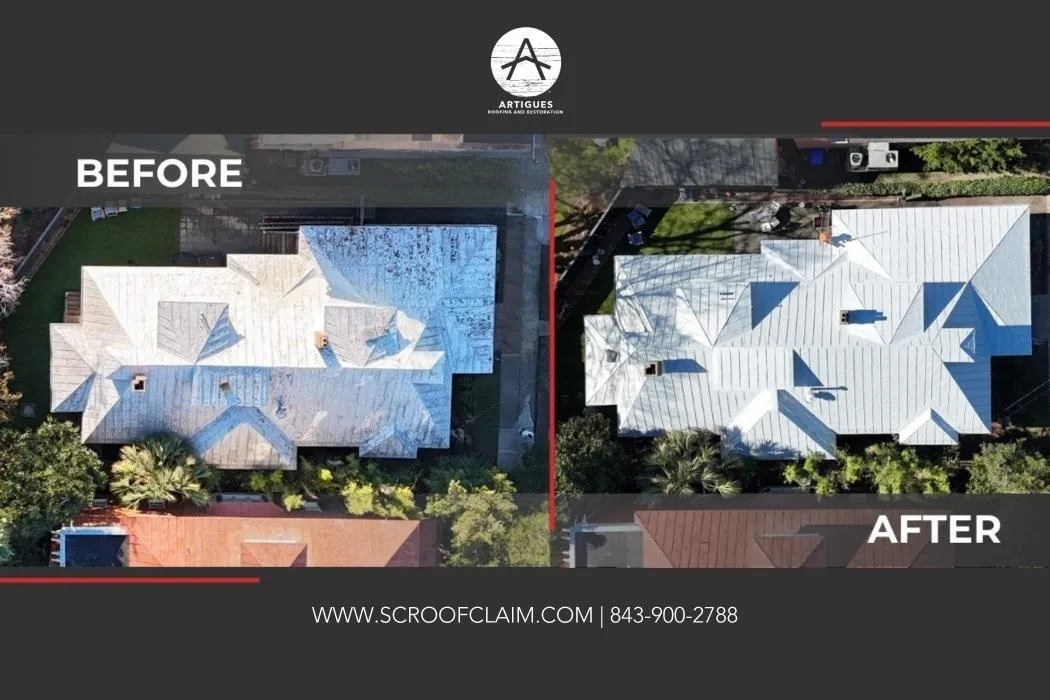
Acrylic Roof Coating: A Strategic Choice for Specific Roofing Needs
By: Brad Artigues, Owner of Artigues Roofing & Restoration Services
In the diverse landscape of roofing solutions, acrylic roof coatings have emerged as a compelling option for certain scenarios, offering unique benefits that can be advantageous under the right circumstances. As the owner of Artigues Roofing & Restoration Services, I have witnessed firsthand the transformative impact acrylic coatings can have on extending the life of a roof and enhancing its performance. However, like any roofing solution, acrylic coatings are not universally applicable. This blog will explore the pros and cons of acrylic roof coatings and outline when they may not be the ideal choice.
The Advantages of Acrylic Roof Coatings
Acrylic roof coatings are fluid-applied membranes that offer several benefits, making them an attractive option for specific roofing needs. These coatings are primarily composed of acrylic polymers, which provide a seamless, reflective, and protective layer over existing roofing materials.
Cost-Effectiveness Acrylic coatings are an affordable way to extend the life of a roof without requiring a complete tear-off and replacement. This can save both time and money.
Reflectivity and Energy Efficiency Highly reflective, acrylic coatings reduce heat absorption and lower cooling costs. This makes them particularly beneficial in hot climates where minimizing thermal gain can significantly impact energy bills.
Ease of Application The application process is relatively straightforward and often requires less labor than traditional roofing replacements. This simplicity can translate to lower installation costs and shorter project timelines.
Environmental Benefits By extending the life of an existing roof, acrylic coatings reduce waste associated with roof replacements. Their reflective properties also contribute to energy efficiency, lowering a building's carbon footprint.
The Limitations of Acrylic Roof Coatings
Despite their advantages, acrylic roof coatings are not without limitations. Understanding these is crucial for making an informed decision.
Weather Sensitivity Acrylic coatings are water-based and require specific weather conditions for optimal application. They should not be applied during cold or wet weather, as this can affect curing and adhesion.
Limited Durability While they can extend a roof's lifespan, acrylic coatings are not as durable as some other roofing materials. Reapplication may be necessary every few years to maintain their protective qualities.
Not Suitable for All Roof Types Acrylic coatings work best on low-slope roofs and are less effective on steep-slope applications. They are also more suitable for roofs in relatively good condition, rather than those with significant damage or structural issues.
When Acrylic Roof Coatings Are Not the Right Choice
Knowing when acrylic roof coatings may not be the best option is essential to avoid potential pitfalls.
Severe Roof Damage If a roof has extensive damage—such as large leaks, structural weaknesses, or significant material degradation—an acrylic coating may not provide the necessary protection or structural integrity. In such cases, a full roof replacement or more robust repair may be required.
Cold or Humid Climates In regions with consistently cold or humid weather, the application and performance of acrylic coatings can be compromised. Proper curing requires dry conditions, and high humidity can interfere with this process.
Steep-Slope Roofs Acrylic coatings are generally not recommended for steep-slope roofs due to potential runoff and inadequate coverage. Traditional shingles or metal roofing may be more appropriate for these applications.
Conclusion: Tailored Solutions for Optimal Results
Acrylic roof coatings offer a versatile and cost-effective solution for extending the life of certain types of roofs, particularly in climates where their reflective properties can enhance energy efficiency. However, they are not a one-size-fits-all solution. At Artigues Roofing & Restoration Services, we advocate for a tailored approach to roofing, ensuring that each solution aligns with the unique requirements of the building and its location.
By understanding the strengths and limitations of acrylic roof coatings, homeowners and facility managers can make informed decisions that optimize both performance and value. If you're considering whether acrylic roof coatings are right for your roof, contact Artigues Roofing today for expert guidance and personalized solutions.